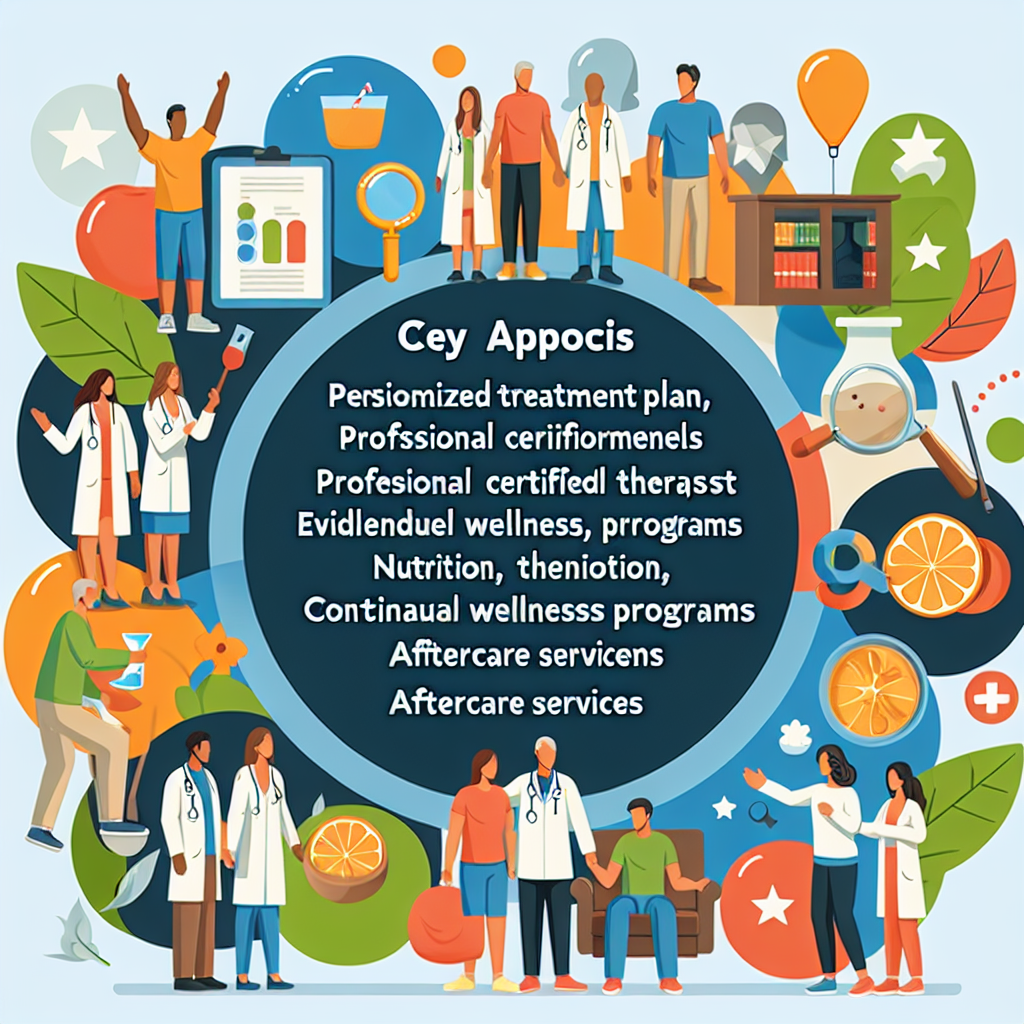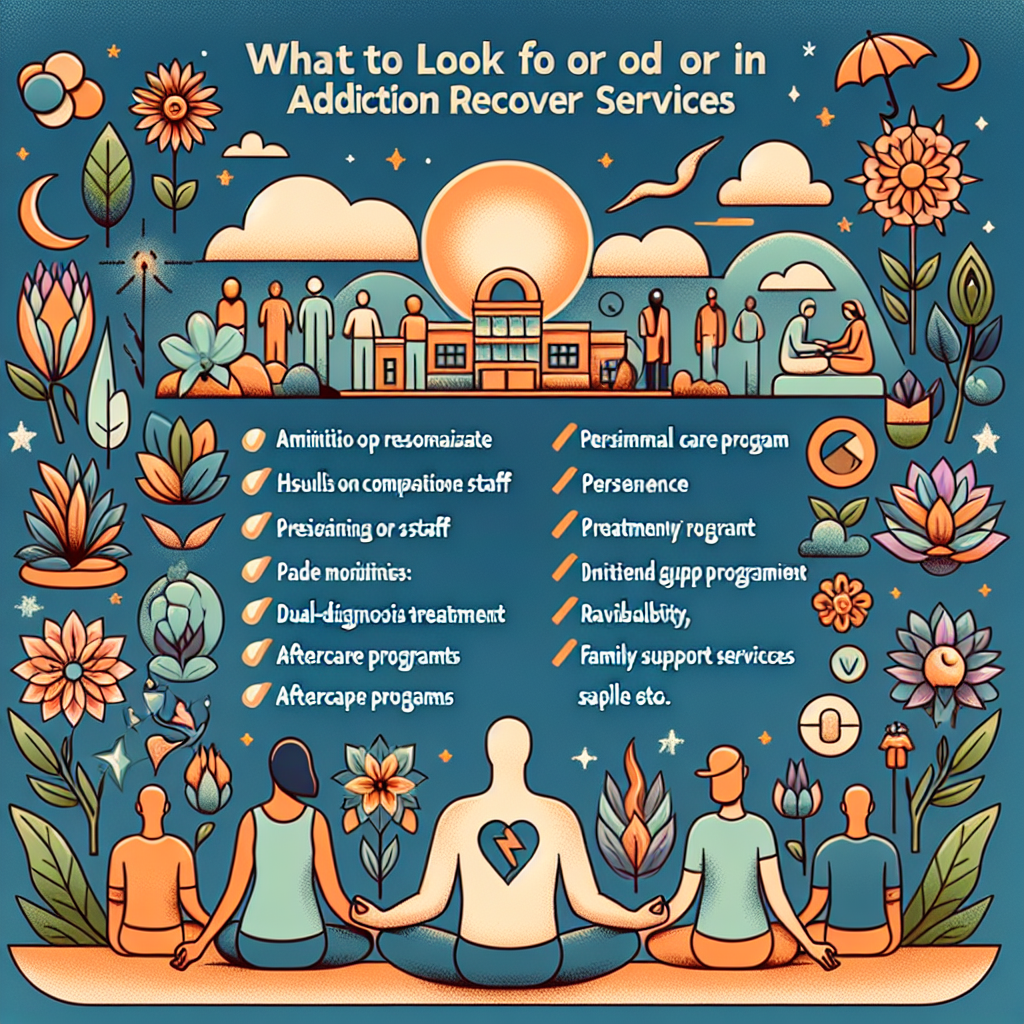-
Table of Contents

“Find personalized care, compassionate support, and evidence-based treatment for lasting recovery.”
Introduction
When seeking addiction recovery services, it is crucial to consider several key factors to ensure effective and comprehensive treatment. Look for programs that offer personalized treatment plans tailored to individual needs, including medical detoxification, therapy, and aftercare support. Verify the credentials and experience of the staff, ensuring they are qualified professionals in addiction treatment. Assess the range of therapies provided, such as cognitive-behavioral therapy, group therapy, and holistic approaches. Additionally, consider the facility’s environment, support for co-occurring mental health disorders, family involvement, and the availability of long-term support to prevent relapse. Evaluating these aspects can help in choosing a recovery service that provides a strong foundation for lasting sobriety.
Key Features To Consider In Addiction Recovery Services
When seeking addiction recovery services, it is crucial to identify key features that can significantly impact the success of the recovery journey. The first aspect to consider is the comprehensiveness of the treatment program. A holistic approach that addresses not only the physical aspects of addiction but also the psychological, emotional, and social dimensions is essential. This means looking for services that offer a combination of medical detoxification, counseling, behavioral therapies, and support groups. By addressing the multifaceted nature of addiction, these programs can provide a more robust foundation for long-term recovery.
Equally important is the customization of the treatment plan. Each individual’s experience with addiction is unique, and a one-size-fits-all approach is often insufficient. Personalized treatment plans that take into account the specific needs, preferences, and circumstances of the individual can lead to more effective outcomes. This might include tailored therapy sessions, individualized counseling, and customized aftercare plans. By focusing on the unique aspects of each person’s situation, recovery services can offer more targeted and effective support.
Another critical feature to consider is the qualifications and experience of the staff. The expertise and compassion of the professionals involved in the recovery process can make a significant difference. Look for programs that employ licensed and certified addiction specialists, therapists, and medical professionals. Their experience and knowledge can provide invaluable guidance and support throughout the recovery journey. Additionally, staff who demonstrate empathy and understanding can help create a safe and nurturing environment, which is vital for healing and growth.
The availability of aftercare and ongoing support is another essential factor. Recovery from addiction is a long-term process that extends beyond the initial treatment phase. Effective recovery services should offer comprehensive aftercare programs that include continued counseling, support groups, and resources to help individuals maintain their sobriety. This ongoing support can help prevent relapse and provide a network of encouragement and accountability. By ensuring that there is a plan in place for continued support, individuals can feel more confident and prepared to navigate the challenges of long-term recovery.
Furthermore, the integration of family involvement can be a powerful component of addiction recovery services. Addiction often affects not just the individual but also their loved ones. Programs that include family therapy and education can help repair relationships, build a support system, and foster a deeper understanding of the recovery process. By involving family members, recovery services can create a more supportive and cohesive environment, which can be instrumental in the individual’s healing journey.
Accessibility and affordability are also important considerations. High-quality addiction recovery services should be accessible to those who need them, regardless of their financial situation. Look for programs that offer flexible payment options, sliding scale fees, or financial assistance. Additionally, consider the location and availability of services. Programs that are easily accessible and offer flexible scheduling can help reduce barriers to seeking treatment.
Lastly, the overall philosophy and approach of the recovery program should align with the individual’s values and beliefs. Whether it is a faith-based program, a 12-step approach, or a secular method, finding a program that resonates with the individual’s personal beliefs can enhance their commitment and engagement in the recovery process. By choosing a program that aligns with their values, individuals can feel more connected and motivated to pursue their recovery goals.
In conclusion, when evaluating addiction recovery services, it is essential to consider the comprehensiveness of the treatment program, the customization of the treatment plan, the qualifications and experience of the staff, the availability of aftercare and ongoing support, the integration of family involvement, accessibility and affordability, and the overall philosophy of the program. By carefully considering these key features, individuals can find the support and resources they need to embark on a successful and transformative recovery journey.
Essential Criteria For Choosing Effective Addiction Recovery Programs
When seeking addiction recovery services, it is crucial to identify programs that offer comprehensive and effective support tailored to individual needs. The journey to recovery is deeply personal, and finding the right program can significantly impact one’s success. To begin with, it is essential to look for programs that provide a holistic approach to treatment. This means they should address not only the physical aspects of addiction but also the psychological, emotional, and social factors that contribute to substance abuse. A well-rounded program often includes medical detoxification, counseling, behavioral therapies, and support groups, ensuring that all facets of the individual’s well-being are considered.
Moreover, the qualifications and experience of the staff play a pivotal role in the effectiveness of addiction recovery services. It is important to choose a program where the team comprises licensed and certified professionals, including doctors, therapists, and counselors who specialize in addiction treatment. Their expertise and compassionate approach can make a significant difference in the recovery process, providing the necessary guidance and support to navigate the challenges of overcoming addiction.
Another critical factor to consider is the program’s treatment philosophy and methodology. Evidence-based practices, such as Cognitive Behavioral Therapy (CBT), Motivational Interviewing (MI), and Medication-Assisted Treatment (MAT), have been proven to be effective in treating addiction. Programs that incorporate these methods are more likely to offer reliable and scientifically-backed treatment options. Additionally, it is beneficial to look for programs that offer personalized treatment plans. Each individual’s journey through addiction and recovery is unique, and a one-size-fits-all approach is often insufficient. Personalized plans that are tailored to the individual’s specific needs, preferences, and circumstances can enhance the likelihood of successful recovery.
Furthermore, the availability of aftercare and ongoing support is a crucial aspect of any addiction recovery program. Recovery does not end with the completion of a treatment program; it is a lifelong process that requires continuous effort and support. Programs that offer aftercare services, such as alumni groups, continued counseling, and relapse prevention strategies, can provide the necessary resources to help individuals maintain their sobriety and navigate the challenges of post-treatment life.
In addition to these elements, the environment and setting of the recovery program can also influence its effectiveness. A supportive, safe, and nurturing environment can foster healing and growth, making it easier for individuals to focus on their recovery. Whether it is a residential treatment center, an outpatient program, or a community-based support group, the setting should promote a sense of security and belonging.
Lastly, it is important to consider the program’s success rates and testimonials from former clients. While no program can guarantee success, high success rates and positive feedback from those who have completed the program can provide valuable insights into its effectiveness. Hearing about others’ experiences and achievements can also serve as a source of inspiration and hope, reinforcing the belief that recovery is possible.
In conclusion, choosing the right addiction recovery services involves careful consideration of various factors, including a holistic approach to treatment, qualified staff, evidence-based practices, personalized plans, aftercare support, a conducive environment, and proven success rates. By prioritizing these essential criteria, individuals can find a program that not only addresses their specific needs but also empowers them to embark on a transformative journey towards lasting recovery.
Q&A
1. What types of therapies are offered in addiction recovery services?
– Look for services that offer a range of evidence-based therapies, such as cognitive-behavioral therapy (CBT), dialectical behavior therapy (DBT), and motivational interviewing, as well as holistic approaches like mindfulness and art therapy.
2. What kind of support is available post-treatment?
– Ensure the program provides comprehensive aftercare planning, including ongoing counseling, support groups, relapse prevention strategies, and resources for reintegration into daily life.
Conclusion
When seeking addiction recovery services, look for comprehensive treatment plans that include medical detoxification, evidence-based therapies (such as cognitive-behavioral therapy and motivational interviewing), and aftercare support. Ensure the program offers individualized treatment plans, qualified and licensed staff, and a supportive environment. Additionally, consider services that address co-occurring mental health disorders, provide family involvement, and offer long-term support options like sober living arrangements and ongoing counseling.



